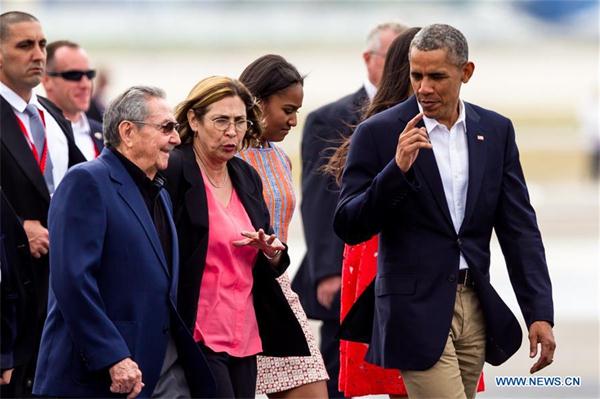Obama fails to tackle main issues during Cuba visit

 |
| Cuba's President Raul Castro (1st L, front) bids farewell to the visiting US President Barack Obama (1st R, front) at the Jose Marti International Airport in Havana, capital of Cuba, March 22, 2016. [Photo/Xinhua] |
US President Barack Obama began a historic visit to Cuba on Sunday, the first by a US president in 88 years. He toured the old town in Havana known as Habana Vieja, met Cuban leader Raul Castro, delivered a speech that was televised live and watched a baseball game between US and Cuban teams, among other things.
Before the trip, the US Commerce and Treasury departments announced amendments to the US sanctions regulations on Cuba, making it slightly easier for travel, financial transactions and doing business between the two countries, which are only 144.84 kilometers from each other.
Obama should be praised for his efforts toward normalizing relations between the two countries over the past years, an effort that resulted in the reopening of their respective embassies last summer. But it was still just the start, and in fact many people had expected such progress during his first term in office, not the second term, based on his previous promises.
And while Obama deserves credit for making the trip, he has not addressed some key questions while passionately preaching so-called American values in his speech at the ornate Gran Teatro in Havana on Tuesday.
Obama said he was asking the US Congress to lift the 54-year embargo on Cuba, yet he didn't mention much about how such an embargo has caused to the sufferings of 11 million Cuban people, including women and children. He has not shown the courage to apologize for such a gross violation of the human rights of the Cuban people.
During my three trips to Cuba, the Cubans called it blockade because the embargo is so comprehensive that it has hurt Cuba and Cuban people in every aspect. It is a typical example of a big nation bullying a small nation. There is no doubt that the US is the country most obsessed with sanctioning other nations, sanctions that have repeatedly proved failures in the past.
It is sad that people still couldn't see any hope even today that such an inhuman embargo will be lifted by the US Congress anytime soon. On the contrary, Republican presidential candidate Ted Cruz, the son of a Cuban immigrant, said he would even close the newly opened embassy if elected.
While lifting the Cuban embargo still seems such a debatable issue in the US, the rest of the world has sent a clear message in the last more than two decades, with some 200 nations passing resolutions condemning the US embargo at the annual United Nations General Assembly sessions.
In his speech, Obama intentionally avoided mentioning Guantanamo Bay, the Cuban territory which the US has occupied for more than a century based on an unequal treaty. On this Cuban soil, the US maintains a large military base in the Caribbean and a notorious detention center, where detainees are held without legal trial.
In that speech, Obama said" I have come here to bury the last remnant of the Cold War in the Americas."
Yet there is no doubt that the embargo and Guantanamo Bay still smack of Cold War and colonialism. And they are two major obstacles for Cuba and the US to further improve their relations.
Obama seemed oblivious to this when he said, "we (Cuba and US) both live in a new world, colonized by Europeans."
But if Obama hopes to claim a major legacy in improving US-Cuban relations, he should fight much harder in the remaining 10 months in office to correct those US Cold War and colonial mistakes.
The author is deputy editor of China Daily USA. [email protected]

































